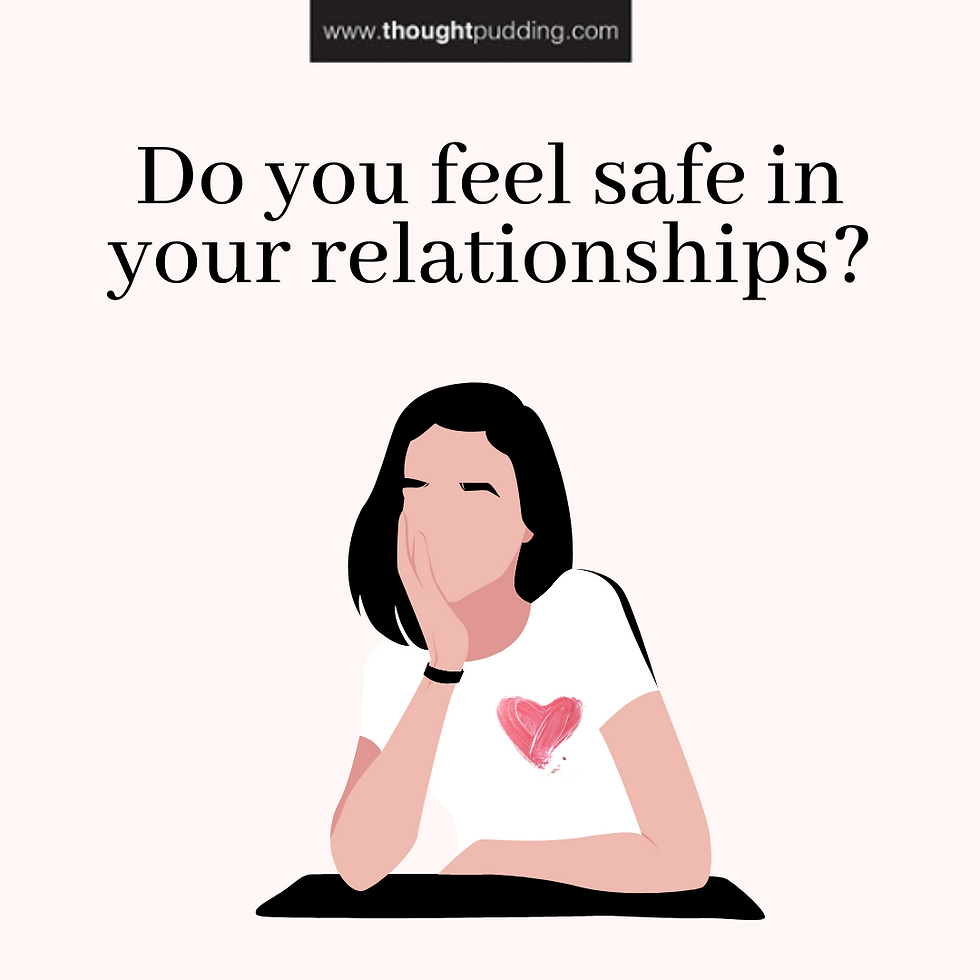Breaking Beyond Bad Break-ups - What you can do!
- Thought Pudding

- Aug 12, 2019
- 4 min read
Updated: Jul 29, 2020
When I began my research on exploring presence of PTRS symptoms in an Indian context (specifically among families of divorcees who survived abuse), the results took me by surprise. Despite the soaring rates of abuse and related divorce cases in the country, it was surprising to see that in most cases, although there were signs of long-lasting ill-effects of abuse, the kind of support these individuals received from their family, friends and society almost completely helped build their resilience, self-confidence and hope.
Although the extent of social support for females were much higher than that for males, it seemed to have a very significant impact on how individuals dealt with their difficulties and built themselves back up from where they crumbled. In fact, the gender bias towards acknowledging the emotional difficulties of male survivors of abuse in itself negatively affected their ability to bounce back from their hurt. They often faced added humiliation of being ‘too weak to be abused’ and restrained from seeking any further help.
Here are some things I learned in my research that can help you or anyone you might know-
It can be important as a society in supporting, understanding and uplifting others around us who may be struggling to get over the wounds of a traumatic past relationship. So the first step is to not judge, pity or look down upon someone who might be going through this. My study has shown me that having a strong support system in the form of family and friends is the strongest anchor for anyone wanting to come out of it, male or female. So all the friends and families out there, be that anchor.
Next, it is important to develop both self-confidence and hope. One way to do this is to bring to focus the aspects of survivor’s life that may have taken a back seat. Survivors I interviewed stressed on how education, career and motivation to achieve was a major boosting factor that urged them to look past their ‘past’ and strive for a better future. It helps to gradually learn that a bad relationship doesn’t define you. There’s a lot more than a bad relationship.
They also found it helpful to understand their trauma in a safe space and so thinking about going for therapy is also something you might want to consider. When we are able to understand the trauma, it helps to break out of its grasp. My interview experience showed that staying in an abusive relationship can take the form of a strange dependence towards the abuser or what in psychology is called trauma bonding. This is not the fault of the survivor but largely the fault of how abuse(r) operates.
The relationship is always episodic where abusers shower their partners with love and affection in the beginning of the relationship and then deprive them of this attention. In order to regain the lost attention and revive the relationship, survivor makes attempts. Occasionally, the abuser will provide bonus bouts of care and attention which are like a reward for the efforts of the survivor. And just like that you are hooked, beginning the cycle of abuse. Remember how Chandler kept getting back with Janice despite the annoyance and suffocation he felt?
Remember you have the option of saying ‘No’ even when you think you don’t, even when you might think it has gone on too long. There’s always an option to say NO.
And if you find yourself unable to say no out of financial constraints, lack of support system then it helps to reach out to mental health professionals and legal aid centres who can connect you with the right resources you need.
“If I could live my life again, I would definitely change a thing or two… I may not regret the moments we shared and the dreams we wove together, but I honestly regret every ‘No’ I didn’t say, the abuse I normalised in the bliss of love, the false hope of ‘loving my way-through to a better future’ - Survivor 3
Towards the end I would like to say, in all of the stories I came across people were able to rise past their prolonged scars from an abusive relationship and so can you. They developed a strength to forget their past and took a new chance at life. And in most cases, what kept them motivated was the support they received from their close friends, family or workplace and the hope within them that they kept burning. Progress will be slow but it will happen.
I also believe that we as a society can work towards helping survivors of trauma (males and females) walk back towards their authentic selves. We could learn to understand and empathise how disabling it could be for a survivor, to face isolation and stigma from their own society but it does not at any cost make them broken.
There is also a need to sensitise the people about forms of abuse, how to identify it and the importance to stand up against mistreatment, even if it is from your (not-so-) better half! Only then can we effectively put a hold on the spread of abuse within relationships.
Prevention of this abuse cycle is better than having generations who learn to believe that abuse is normal.
Disclaimer: If you find yourself not being helped by these options we recommend you reach out to a mental health professional like a psychologist. If you find yourself without a support system, feel free to write to us and we will help you build your support system.

Author: Ria M Jojo, Assistant Professor of Psychology at Kristu Jyothi College.






Comments